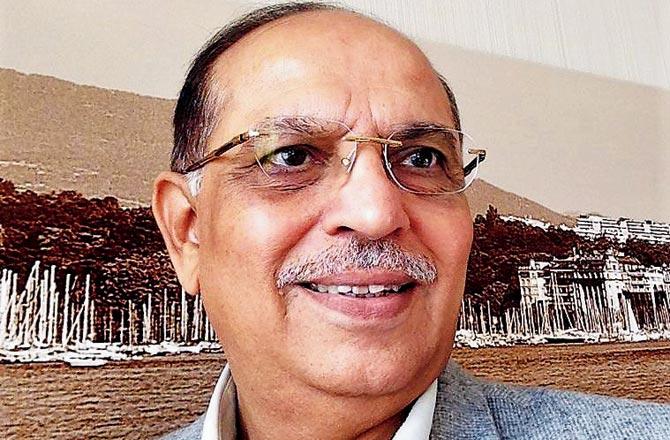Academicians laud states decision to set up four new medical colleges but also warn that students will suffer due to shortage of professors

The proposed government medical college site in Usar village on Alibaug-Roha road
Even as the state government has decided to come up with three new medical colleges from the upcoming academic year, and another in 2022, academicians said that merely increasing the number of colleges without having adequate teaching staff would be of no use. They are of the opinion that students would continue to suffer due to the shortage/lack of qualified teachers, a problem that many colleges have been facing.
The government plans to have three new medical colleges (100 MBBS seats in each) from the academic year 2021-22 at Alibaug, Sindhudurg and Satara, followed by one in Osmanabad from the year 2022-23.

Raigad Guardian Minister Aditi Tatkare along with district officials go through the blueprint of the proposed medical college site outside the Alibaug civil hospital
Education standard
Speaking to mid-day, Dr Ketan Vagholkar, professor of surgery at DY Patil Medical college said, "Having more medical colleges is the need of the hour but rushing into starting the institutes will seriously affect the standard of medical education. Starting a new medical college is not just a mechanical process, but a quality-based one."
Dr Vagholkar added, "Stringent numeric faculty requirements as demanded by the apex registering authority in the past has led to the emergence of so called 'namesake faculty' who have no interest in teaching and are devoid of professional and leadership qualities. This has led to a demoralising effect on budding doctors and specialists. Dynamic, energetic and accomplished medical teachers are needed to improve the standard of medical education. Another key requirement is that the professors should have aptitude for research and international experience. This will enable us to develop our medical education system."

Dr. Subhash Hira, professor of Global Health at the University of Washington-Seattl
Professor Emeritus Dr Vedprakash Mishra, national head of the Academic Programme of Indian Programme UNESCO Chair in Bio-Ethics Haifa and member of the International Committee for Bioethics for Asia Pacific Region, said, "It is indeed laudable that the state government plans to have medical colleges at district headquarters which lack such facility. However, it needs to be borne in mind that medical colleges do not just mean infrastructure created out of brick and mortar. It has to be a vibrant place of teaching, learning, inculcation of clinical skills and desired research."
"The government ought to work out a definite plan for the purpose of having full-time teachers who would meet the requirements. As such the existing burden itself is tough to handle and there is hardly any feasibility of mitigation of the same in the near future. Running and managing medical schools in a compromised manner end up in a generation of compromised manpower, which instead of becoming a boon for the healthcare system ends up in being a peril for the same," he concluded.
'Teachers are the backbone'
Dr. Wiqar Shaikh, professor of Medicine at Grant Medical College and Sir JJ Group of Hospitals, said that the proposal to establish medical colleges in several districts of the state was a welcome move. "However, these will be teaching institutions and therefore the teachers will have to be the backbone of these colleges.
Medical education in India faces severe shortage of teachers. The country has 542 medical colleges, of which 281 are government and 261 are private ones, with a capacity of more than 80,000 MBBS seats. These colleges offer a variety of courses but do not have enough teachers. As the number of medical colleges will increase, the demand for teachers will go up and in turn create a shortage of faculty. Often senior full-time faculty of medical colleges join corporate hospitals or go abroad for lucrative assignments, which leads to brain drain and aggravates the shortage of medical teachers. India trails behind several countries, including Brazil and China in terms of student-teacher ratio in the higher education segment, a government report has revealed. Also, lack of meritorious teachers means that India lags behind in quality medical research and publications," Dr, Shaikh added.
Dr. Subhash Hira, professor of Global Health at the University of Washington-Seattle, USA and former director of AIDS Research & Control Centre (ARCON) at Grant Medical College, Mumbai said, "Medical education and healthcare was initially regulated by Indian Medical Services (IMS) that was equivalent of the Indian Civil Services during the British Raj. Post-independence, the IMS was gradually dismantled and these functions were handled by the Indian Administrative Services (IAS). The IMS established in the 1970s formulated the regulations for medical education, including the curriculum, teaching faculty and the design of medical colleges. Now, a game-changing move has happened with the establishment of the National Medical Commission (NMC) that will modernise medical education and standards of healthcare in India. I am glad to hear that Alibaug in Raigad district is likely to be the first among the six districts to have a medical college with assistance from NMC."
"In the current situation it is important for governments and institutions to invest in quality medical education, services and medical research. A lot more needs to be done by NMC to streamline tuition fees charged by public and private sector institutions, service rules/remunerations/health insurance/personal barrier protection etc," Dr Hira concluded.
The solution
Dr. Shaikh said the appointment of honorary medical teachers could be a solution. "The so-called honorary system was created because of a shortage of full-time medical teachers. Those teachers were supposed to work for a few hours in medical colleges every day and had both patient-care and teaching duties. However, honorary teachers were paid only a stipend and not a salary (current honorarium in medical colleges is Rs1,500 per month) and were permitted private practice outside of their work."
Keep scrolling to read more news
Catch up on all the latest Mumbai news, crime news, current affairs, and a complete guide from food to things to do and events across Mumbai. Also download the new mid-day Android and iOS apps to get latest updates.
Mid-Day is now on Telegram. Click here to join our channel (@middayinfomedialtd) and stay updated with the latest news
 Subscribe today by clicking the link and stay updated with the latest news!" Click here!
Subscribe today by clicking the link and stay updated with the latest news!" Click here!







